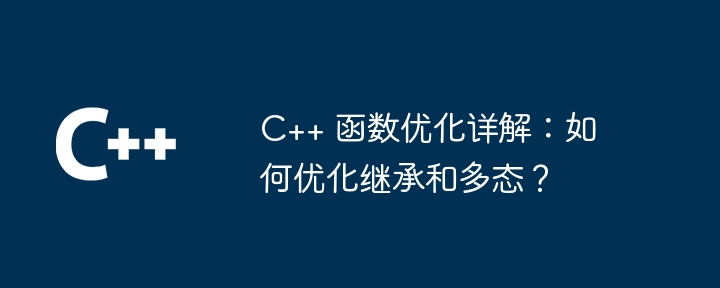Home >Backend Development >C++ >Detailed explanation of C++ function optimization: How to optimize inheritance and polymorphism?
Detailed explanation of C++ function optimization: How to optimize inheritance and polymorphism?
- 王林Original
- 2024-04-30 16:24:011186browse
Optimize C Inheritance and polymorphism: Optimize inheritance: Use virtual inheritance to avoid diamond inheritance problems Try to avoid multiple inheritance Mark base class members as protected or private Optimize polymorphism: Use virtual functions instead of function overloading Use RTTI with caution Consider using virtual Base class

# Detailed explanation of C function optimization: How to optimize inheritance and polymorphism?
In C, inheritance and polymorphism are important concepts in object-oriented programming (OOP). However, improper use of these features can cause performance issues. This article explores how to optimize inheritance and polymorphism to improve the performance of C functions.
1. Optimize inheritance
- Use virtual inheritance to avoid diamond inheritance problems: Rhombus inheritance may lead to duplicate member variables and methods , thus wasting memory and causing performance degradation. Using virtual inheritance can eliminate this duplication.
- Try to avoid multiple inheritance: Multiple inheritance will increase code complexity and possible performance issues. If possible, consider using composition or aggregation instead of multiple inheritance.
- Mark base class members as protected or private: Marking base class members as protected or private can improve performance by preventing derived classes from accessing them unnecessarily.
2. Optimize polymorphism
- Use virtual functions instead of function overloading: Virtual functions allow base classes and derived classes Classes use the same function name to perform different operations, whereas function overloading can only determine at compile time which functions will be called.
- Use RTTI with caution: Run-time type information (RTTI) is used to identify object types at runtime, but it adds overhead. Use RTTI only when absolutely necessary.
- Consider using virtual base classes: Virtual base classes can help eliminate duplication of virtual functions in multiple inheritance, thereby improving performance.
Practical Case
The following code example illustrates the techniques of optimizing inheritance and polymorphism:
class Animal {
public:
virtual void makeSound() {
std::cout << "Animal sound" << std::endl;
}
};
class Dog : public Animal {
protected:
void makeSound() override {
std::cout << "Woof" << std::endl;
}
};
class Cat : public Animal {
protected:
void makeSound() override {
std::cout << "Meow" << std::endl;
}
};
int main() {
Animal* animal = new Dog; // 使用多态
animal->makeSound(); // 调用派生类的虚函数
delete animal;
return 0;
}In this example, we Use virtual function makeSound() to achieve polymorphism. By marking the base class member makeSound() as protected, we avoid derived classes from needlessly accessing it. Additionally, we use dynamic binding to call the correct virtual functions at runtime to maximize performance.
The above is the detailed content of Detailed explanation of C++ function optimization: How to optimize inheritance and polymorphism?. For more information, please follow other related articles on the PHP Chinese website!

